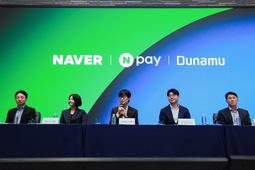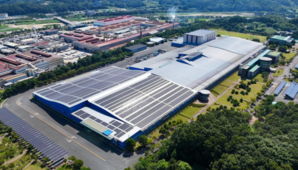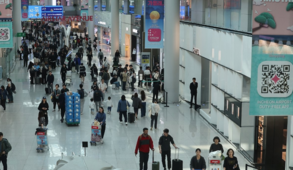
[News Space=Reporter seungwon lee] WeWork Korea Limited (CEO Claudio Andres Hidalgo Saz) succeeded in turning a profit last year from a net loss the previous year, but the red light on its financial soundness has become even stronger. The audit agency warned of “material uncertainties related to going concern” due to liquidity risk and capital erosion caused by a surge in short-term borrowings.
Even the auditors use this as a euphemism for "serious doubts about the company's ability to continue operating normally." In other words, it is a sign that the company is at risk of closing down or going bankrupt immediately, which includes a lack of liquidity, capital impairment, and the inability to repay debts that come due.
According to the audit report disclosed on the Financial Supervisory Service's electronic disclosure system on the 14th, WeWork Korea's consolidated sales (operating revenue) in 2024 were KRW 124.8 billion, up 1.9% from the previous year (KRW 122.5 billion). Operating profit was KRW 51.6 billion, up 5.5% from KRW 48.9 billion the previous year, and net income for the period was a surplus of KRW 99.6 billion, turning a profit from a deficit of KRW 47.9 billion the previous year. The operating profit ratio was recorded at 41.3%.
Cash and cash equivalents are 9.3 billion won, current assets are 20.5 billion won, and current liabilities are 221.9 billion won, so the current ratio is only 9.2%. This is a very low level, meaning that short-term payment ability is extremely weak. This situation can raise significant doubts about its ability to continue as a going concern.
Total liabilities are 900.2 billion won, total capital is -541.8 billion won, which is a complete capital erosion. The deficit amounts to 587.8 billion won.
Long-term borrowings are KRW 173.9 billion, current borrowings are KRW 64.9 billion, and lease liabilities are KRW 477.2 billion (current KRW 40.8 billion, non-current KRW 436.3 billion). Tangible assets are KRW 314.6 billion, long-term financial products are KRW 2.5 billion, and accounts receivable and other receivables such as lease deposits are KRW 26.9 billion.
Short-term borrowings, which are debts that must be repaid within one year, are also a risk factor.
As of December 31, 2024, short-term borrowings (current borrowings) amount to KRW 64.9 billion. This is more than double the previous year (KRW 31.7 billion).
The reason for the rapid increase in short-term borrowings can be interpreted as securing liquidity and operating funds. When there is a shortage of cash generated from operating activities and operating funds are needed, or when it is difficult to secure funds for repayment of existing debt that has reached maturity, or when it is difficult to secure long-term funds such as corporate bonds, there are many cases where short-term borrowings are relied on. In particular, in situations where financial difficulties such as continued deficits, capital erosion, and deterioration in liquidity are severe, the dependence on short-term borrowings tends to increase in order to meet urgent funding needs.
An increase in short-term borrowings can be a serious risk factor as it signals a red light to the financial soundness of a company. As in the case of WeWork Korea, where the current ratio plummeted to 9.2% and a liquidity crisis became a reality, the risk of insolvency increases when the ratio of short-term borrowings to cash assets is high.
In addition, short-term borrowings often have higher interest rates than long-term borrowings, which increases the interest burden. In 2023, the average interest rate on short-term borrowings of domestic listed companies was 5.2%, 1.4%p higher than long-term borrowings (3.8%), which acted as a factor in reducing net income by 15-20%.
In particular, if the proportion of short-term borrowings in total debt (short-term borrowing ratio) exceeds 70%, credit rating agencies classify it as an investment grade. In 2024, 23% of listed companies exceeded this standard, and the average decline in stock prices of these companies reached 40%.
In other words, an increase in short-term borrowings causes a vicious cycle of liquidity crisis → increased interest burden → credit rating downgrade → funding difficulties. Companies must secure financial stability by improving operating cash flow and transforming their long-term debt structure, and investors must check the short-term borrowing/current asset ratio (recommended to be less than 30%) and the cash flow coverage ratio (100% or more).
Another risk factor is that as of the end of 2024, there is one lawsuit pending as a defendant (with a lawsuit amount of 116 million won), and the outlook for the lawsuit is uncertain.
Selling and administrative expenses (operating expenses) in 2024 were KRW 73.2 billion, a slight decrease from the previous year (KRW 73.5 billion). Of this, advertising and publicity expenses were KRW 1.3 billion (KRW 2.5 billion, 46% decrease from the previous year), salaries were KRW 6.1 billion (KRW 6.1 billion, 36% increase from the previous year), commissions were KRW 8.9 billion (KRW 6.5 billion, 36% increase from the previous year), stock compensation expenses were KRW 200 million (KRW 250 million, 36% increase from the previous year), retirement benefits were KRW 1 billion (KRW 900 million, 36% increase from the previous year), depreciation expenses were KRW 39.2 billion, and other expenses (impairment losses, etc.) were KRW 4.4 billion.
The accounting firm auditor pointed out that “there is significant uncertainty regarding the company’s ability to continue as a going concern, as the company’s current liabilities exceed current assets by KRW 201.4 billion and its total liabilities exceed its total assets by KRW 541.8 billion.” However, they expressed an unqualified opinion based on the financial support plan of WeWork Companies LLC, the intermediate holding company, within 12 months.
Due to the continued deficit in 2024, no dividends were paid. 200 million won in stock compensation expenses were recorded for key executives, and 1 billion won was paid as retirement benefits.
Transactions with special related parties (WeWork Group) in 2024 resulted in import commissions of KRW 380 million, payment commissions of KRW 1.64 billion, interest expenses of KRW 1.63 billion, and other expenses of KRW 230 million. Accounts receivable to special related parties amounted to KRW 7.4 billion, and accounts payable amounted to KRW 75.8 billion.
WeWork Korea's rental fee transaction amount with its subsidiaries, WeWork Seoul 1-5 and Busan 1, amounts to 6.49 billion won. This is an internal transaction, not recognized as external sales in the consolidated financial statements, and is separately recorded in the details of special related party transactions in a separate audit report.
Most of the long-term borrowings (KRW 238.8 billion) were raised from the parent company (WeWork Asia Holding Company BV). The main risks are complete capital erosion and liquidity crisis, exchange rate fluctuation risk due to foreign currency borrowing, and dependence on parent company support.
Management plans to maintain a surplus by attracting new members and targeting premium corporate customers. However, given the liquidity crisis, complete capital erosion, and the uncertainty surrounding its survival without substantial support from the parent company, it is assessed that sustainability is limited without fundamental improvements to the financial structure.
A corporate finance analysis expert emphasized, “Even with a net profit turnaround, there is a liquidity risk due to capital erosion and a surge in debt and short-term borrowings, so restructuring is urgent,” adding, “Above all, resolving the uncertainty of going concern pointed out by the auditing agency is a future task.”
Meanwhile, WeWork Korea Limited was established on December 10, 2015 in accordance with the Commercial Act of the Republic of Korea, and its main business is real estate leasing. It currently owns six subsidiaries. The paid-in capital is 3.95 billion won, and WeWork Asia Holding Company BV holds a 100% stake.
WeWork Korea recorded sales of KRW 122.5 billion in 2023, maintaining its top spot in Korea based on pure shared office sales. WeWork entered the Korean market in 2016, and Korea is known as the country that has consistently recorded the highest desk occupancy rate among the regions directly operated by WeWork around the world.
























































